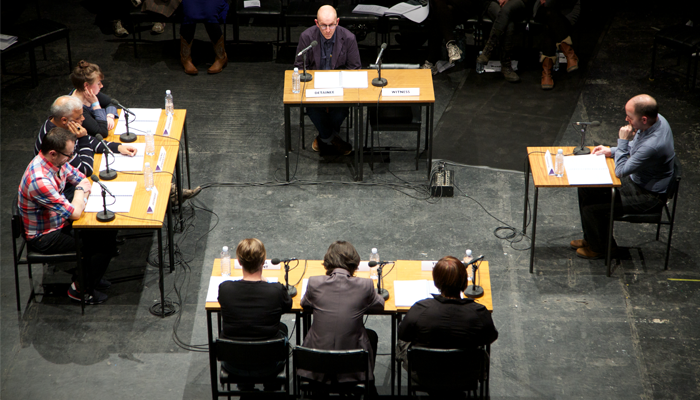Film Programme: Sonic Landscapes
Film Programme: Sonic Landscapes
Can a musician create a sonic photograph; something with a depth of field, where you can hear sounds and their interconnections, much as you see objects and their relationships in a photo? Could a filmmaker use musical concepts to represent landscape?
This programme has two kind of complimentary strands, both looking at landscape through the normal approaches of another artform. On the one hand we have here some artists who have ignored image but treated sound/ music in the same way as a landscape might be treated visually (Luc Ferrari and Walter Ruttman’s sonic photographs, concerned with depth of field, focus, attention, foreground/ background etc and so on…).
On the other, we’ve got filmmakers who have ignored sound, but still used musical ideas (like Anton Webern’s serialist composition technique in which a finite number of units are arranged systematically until exhaustion) to create a new kind of document of landscape.
This programme includes sound works that aspire to and sometimes go beyond the visual: Luc Ferrari’s masterpiece Presque Rien, a sonic photograph of a Dalmatian fishing village at dawn; Walter Ruttman’s Weekend, a 35mm film shot over a weekend in Berlin in the last 1920 without ever removing the lens cap, and treating the 35mm camera as the most sophisticated sound recording device of it’s time.
And it contains works by silent film works that turn musical concepts towards vision: Kurt Kren’s TV, in which a structure inspired by the “serialist” composition techniques of the composer Anton Webern, in which a set of units (sounds, or here images) are arranged logically in series without repeating their order.
21/87, Dir. Arthur Lipsett, 1963, Canada, 16mm, 11 mins
“Lipsett dramatises the essential dialectic: Are we physical beings or spiritual ones? His use of the term “the force” inspired George Lucas’s Star Wars cosmology. That aside, the contrast between the body and the soul is clearly made throughout Lipsett’s film.” (National Film Board of Canada)
Presque rien No. 1 ou Le lever du jour au bord de la mer, Luc Ferrari, 1967-70, France, Audio, 20 mins
“I went everywhere with my tape recorder and microphone, and I was in this Dalmatian fishing village, and our bedroom window looked out on a tiny harbour of fishing boats, in an inlet in the hills, almost surrounded by hills-which gave it an extraordinary acoustic. At night the silence woke me up – that silence we forget when we live in a city. And then I hit upon an idea – I recorded those sounds which repeated every day: the first fisherman passing by same time every day with his bicycle, the first hen, the first donkey, and then the lorry which left at 6am to the port to pick up people arriving on the boat. Events determined by society. I think it’s good to have a really strong concept-and then to forget it. If not, things can pass you by… You have to listen to your intuition.” (Luc Ferrari)
15/67 TV, Dir. Kurt Kren, 1967, Austria, 16mm, 4 mins 8 secs
“Instead of operating primarily at the kinetic level, or with rapid perceptual rhythm, this film involves the audience in a conceptual and reflexive process. Five short sequences, each about eight frames long, are all shot from the same viewpoint in a quay-side cafe… Each shot containing some small movement is repeated in the film 21 times, in mathematically determined order. They are separated by short, equal sequences of black spacing, except that longer black sequences separate larger phrases of repeats from each other rather like punctuation. The significance does not lie in the mathematical sequences as such, but in how the viewer attempts to decipher the structure.” (Malcolm Le Grice, Abstract Film and Beyond)
Weekend, Dir. Walter Ruttmann, 1930, Germany, Audio, 11 mins 30 secs
“Walter Ruttmann collects sound recordings of a weekend in Berlin: from finishing work on Saturday to starting the next week on Monday morning. With his ear for the narrative as well as the visual, Ruttmann works on a kind of audio-art. His formulations can also designate structure on the basis of musical points of departure such as pitch and rhythm . But the characteristic style of Weekend is thoroughly narrative-related. Tone coloring, rhythm, and pitch merely customise the storytelling.” (Golo Föllmer)
The screening was originally also due to include Dimanche, Dir. Edmond Bernhard, 1963, Belgium, 16mm, 20 min, but the print could not be obtained in time.
Below are online links which you can use for reference. To see the films in their original glory, check with the distributor of the film for their terms and conditions.
Documentation
Artists

